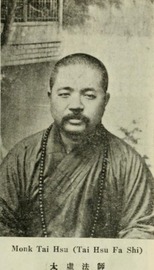en.wikipedia.org
Always private
DuckDuckGo never tracks your searches.
Learn MoreYou can hide this reminder in Search Settings
All regions
Argentina
Australia
Austria
Belgium (fr)
Belgium (nl)
Brazil
Bulgaria
Canada (en)
Canada (fr)
Catalonia
Chile
China
Colombia
Croatia
Czech Republic
Denmark
Estonia
Finland
France
Germany
Greece
Hong Kong
Hungary
Iceland
India (en)
Indonesia (en)
Ireland
Israel (en)
Italy
Japan
Korea
Latvia
Lithuania
Malaysia (en)
Mexico
Netherlands
New Zealand
Norway
Pakistan (en)
Peru
Philippines (en)
Poland
Portugal
Romania
Russia
Saudi Arabia
Singapore
Slovakia
Slovenia
South Africa
Spain (ca)
Spain (es)
Sweden
Switzerland (de)
Switzerland (fr)
Taiwan
Thailand (en)
Turkey
Ukraine
United Kingdom
US (English)
US (Spanish)
Vietnam (en)
Safe search: moderate
Strict
Moderate
Off
Any time
- Was this helpful?
- Taixu wearing his traditional kāṣāya robes.. Taixu was born in Haining in Zhejiang province. His lay name was Lǚ Pèilín (呂沛林). His parents died when he was still young, and he was raised by his grandparents. At 16, he was ordained into the Linji school of Chan Buddhism in Xiao Jiǔhuá Temple (小九華寺) in Suzhou.Not long after being ordained he was given the Dharma name of ...
britannica.com
Taixu (born January 8, 1890, Haining, Zhejiang province, China—died March 17, 1947, Shanghai) was a Chinese Buddhist monk and philosopher who sought to revitalize modern Buddhism throughout the world.. Taixu received his early training in Buddhism in the Tiandong Monastery near Ningbo.In 1912 he helped organize the Association for the Advancement of Buddhism with headquarters in Nanjing.Author:The Editors of Encyclopaedia Britannicaencyclopediaofbuddhism.org
encyclopediaofbuddhism.org
https://www.encyclopediaofbuddhism.org › wiki › Taixu
Taixu was born in Hǎiníng (海寧) in Zhejiang province. His lay name was Lǚ Pèilín (呂沛林). His parents died when he was still young, and he was raised by his grandparents. At 16, he was ordained into the Linji school of Chan Buddhism in Xiao Jiǔhuá Temple (小九華寺) in Suzhou.Not long after being ordained he was given the Dharma name of Taixu, meaning Great Emptiness.oxfordre.com
Oxford Research Encyclopedia of Social Work
https://oxfordre.com › religion › abstract › 10.1093 › acrefore › 9780199340378.001.0001 › acrefore-9780199340378-e-1018
Taixu devoted his life to two activities: spreading Buddhism throughout society and reforming Buddhist monastic and lay institutions. A dynamic between reform and propagation is evident in all of his projects, including Humanistic Buddhism, establishing a pure land in the human realm, his Maitreya School, and his Buddhist academies. ...encyclopedia.com
TAIXU. TAIXU (1890 - 1947), Chinese Buddhist reformer, founder of the Wuchang Buddhist Institute and the Buddhist journal Haichaoyin, and active participant in various Buddhist movements.Taixu's lay name was L ü Peilin. Born in Haining in Zhejiang, he became a monk of the Linji school of Chan Buddhism at the age of sixteen. Buddhist scriptures as well as the radical political writings of ...oxfordbibliographies.com
A biography and bibliography of Taixu, a modern Chinese Buddhist leader who advocated for Engaged Buddhism and Humanistic Buddhism. Learn about his life, works, and influence on contemporary Buddhism.academic.oup.com
This chapter examines how Taixu, a Chinese Buddhist reformer and intellectual, used Yogācāra to demonstrate the relevance of Buddhism to Western science and philosophy in the 1920s. It analyzes his writings and speeches on topics such as social evolution, psychology, the theory of relativity, and the reformation of the individual.tibetanbuddhistencyclopedia.com
tibetanbuddhistencyclopedia.com
https://tibetanbuddhistencyclopedia.com › en › index.php?title=Taixu
Taixu writes, Science therefore, can never be the main support of Buddhism although it may act as a valuable auxiliary and much may be expected from uniting the two methods of investigation. From his writings Taixu's followers can grasp an understanding that he believes science is a valuable resource but because of people's steadfast faith in ...en.lingyinsi.org
en.lingyinsi.org
en.lingyinsi.org › list_336.html
Master Taixu (1889-1947), one of the four eminent monks in the Republic of China, used to be the chief Buddhist monk of Lingyin Temple. His secular surname was Li and first name Peilin or Peisen. He was born on December 28, 1889 in Chang'an Town, Haining City in Zhejiang Province.min.news
Dec 7, 2024In 1925, Master Taixu preached the "Jing Wang Jing", one of the "Three Classics of Protecting the Country", in Beijing's Central Park, which stimulated the patriotic enthusiasm of the society. In 1928, the Japanese army created the "Jinan Massacre". When the news came, Master Taixu immediately devoted himself to resisting Japan and saving the ...Can’t find what you’re looking for?
Help us improve DuckDuckGo searches with your feedback
